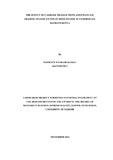| dc.description.abstract | Commercial banks income structures over the years have mainly been dominated by
interest income generated from loans and advances to customers followed distantly by
non-funded also known as non-interest income. However in recent years Banks have
increasingly been generating income from off-balance sheet business and fee income.
Technological advancements have greatly increased product base in banks leading to
new revenue streams such as mobile banking, card usage, online banking and cashless
transactions through bank agents and merchants. The study sought to establish the
effect of cashless transactions and financial trading income on non-funded income in
commercial banks in Kenya. The research design employed in this study was
descriptive in nature. The target population in this study was the 43 commercial banks
that were fully registered with CBK by December 2013. The data used in this study
was quantitative in nature. The secondary data for five years (2009-2013) was
obtained from annual publications by central bank as well as financial statements of
commercial banks. This includes statement of financial position and directors reports.
Multiple linear regression Analysis was used to examine the relationship between
cashless transactions income, financial trading income and non- funded income in
commercial banks in Kenya. From the regression model, the study found out that
there were factors influencing the non-funded income of commercial banks in Kenya,
which are cashless transactions income, financial trading income, banks interest rates,
inflation and size. They either influenced it positively or negatively. The study found
out that the intercept was 4.312 for all years. The five independent variables that were
studied (cashless transactions income, financial trading income, banks interest rates,
inflation and size) explain a substantial 89.3% of non-funded income in commercial
banks in Kenya as represented by adjusted R2 (0.893). The study established that the
coefficient for cashless transactions income was 0.537, meaning that cashless
transactions income positively and significantly influenced the non-funded income in
commercial banks in Kenya. The study also established that the coefficient for
financial trading income was 0.707, meaning that financial trading income positively
and significantly influenced the non-funded income in commercial banks in Kenya.
The study concluded that cashless transactions income and financial trading income
have a positive effect on non- funded income in commercial banks in Kenya. The
study recommended that banks should conduct research on other possible mobile
money services packages that are user friendly and develop them so as to enable
deposit/withdraw of money using mobile phone which will meet different customer
requirements and capture market niches that competitors have not identified hence expand on the market share leading to improved non-funded income. | en_US |

